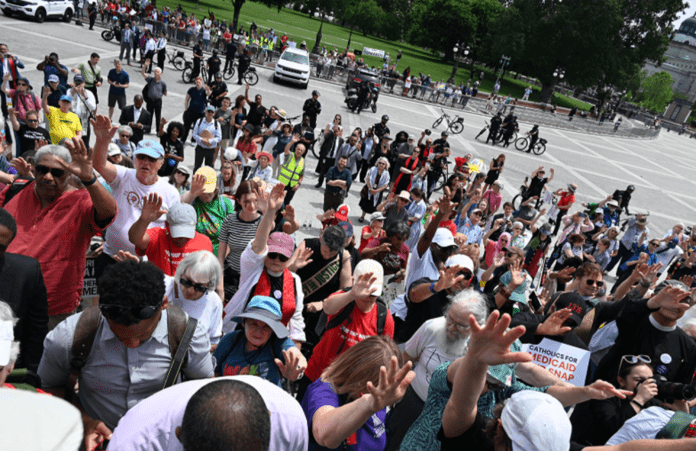“You go into any community, anywhere in Virginia and Maryland and Texas, and you’ve got two institutions holding that community together: the local school and the local church,” he said. “There is a symbiosis between the two.”
Johnson said he believes Trump intervened to support the Texas voucher bill, but a similar proposed federal program may not be supported by Republican senators such as Deb Fischer of Nebraska, Lisa Murkowski of Alaska and Susan Collins of Maine. As he finished speaking, Johnson turned and joined other faith leaders as they entered a Senate office building to meet with lawmakers’ staff.
Meanwhile, the Rev. William Barber II and other faith leaders have spent weeks holding “Moral Monday” demonstrations on Capitol Hill against the budget proposal. On three separate occasions, Barber and other faith leaders have been arrested in the Capitol Rotunda while praying against the legislation.
Some religious groups have been selective in their criticism of the bill. In a recent letter sent to elected officials on Capitol Hill, leaders of the U.S. Conference of Catholic Bishops lauded provisions that would prohibit Medicaid funds from going to Planned Parenthood, while also calling on lawmakers to “reconsider provisions that will harm the poor and disadvantaged, our immigrant brothers and sisters, and our environment.”
But leaders of other Catholic groups, such as Network, a Catholic social justice lobby, condemned the bill at the rally on Tuesday, and dissent has emerged among bishops. Last week, Archbishop John Wester of Santa Fe, New Mexico, published an editorial in America Magazine, a Catholic publication, urging his fellow bishops to oppose the bill in its entirety.
“I think the bill is robbing from the poor to give to the rich,” Wester told RNS. “It’s the opposite of the Robin Hood effect.”

A sign during a rally against the current budget bill, June 10, 2025, in Washington. (RNS photo/Jack Jenkins)
Wester took particular issue with how the bill would fund Trump’s immigration agenda, which recently sparked widespread protests in California and elsewhere. Referring to fear expressed by immigrants he knows, he said the U.S. is at an inflection point.
“I feel like we’re in Nazi Germany in 1933,” Wester said.
While Wester said he understood the Catholic church should sometimes be evenhanded about legislation because “politics is the art of compromise,” this budget proposal goes too far.
“To me, this bill is so bad and so mean and so obviously geared toward the rich and against the poor that we can’t do that,” he said. “I fear that by saying, ‘Oh yeah — well, parts of (it) we like and parts we don’t like,’ that kind of gives an implicit green light. There’s no way the Catholic Church can live with this bill. It’s a terrible bill, and it needs to be completely redone.”
This article originally appeared here.

